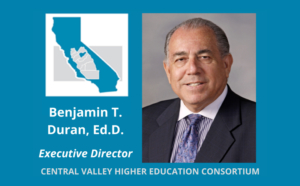[vc_row][vc_column][vc_images_carousel images=”6250,6225,6227,6226,6229,6228,6269,6230,6231,6232,6236,6267,6235,6233,6224,6244,6245,6265,6238,6264,6237,6247,6246,6248,6274,6270″ img_size=”large” slides_per_view=”3″ autoplay=”yes” wrap=”yes” css_animation=”fadeIn”][/vc_column][/vc_row][vc_row][vc_column][vc_column_text]

See our broadband disparity video, “Pursuing The Last Mile,” released in May 2021.
With the close of 2021 – or the second pandemic year — we present a glimpse back at top stories featured in the Central Valley Higher Education Consortium e-newsletter:
• JANUARY
An innovative master’s degree program launched in January, “Dual Enrollment Upskilling Teachers Master’s Program in English and Math,” was designed to incentivize dual enrollment delivery at Central Valley high schools and address an equity concern raised by the CVHEC’s Central Valley Dual Enrollment for Equity and Prosperity (CVDEEP) Task Force: not enough Central Valley teachers are available to teach dual enrollment resulting in fewer opportunities for students and fueling an equity gap.
(See December for the first graduating cohort).
Miguel Contreras, a 22-year-old student majoring in nursing at College of the Sequoias (COS), was featured in a special year-long project by photojournalist Rachel Bujalski for The Lumina Foundation (Lumina), a partner of the Central Valley Higher Education Consortium. The photo project, which was published on Lumina’s website, presented a candid, close up look at the lives of five low-income students and the immense college challenge they face during the COVID-19 pandemic.
• MARCH
CVHEC launched its Equity, Race, and Social Justice Taskforce to assess and recommend action for its 29 member institutions in Central California’s nine-county region with findings and recommendations planned for presentation at the CVHEC Higher Education 2022 Summit. Convened in response to the social unrest of summer 2020 and the impacts of the pandemic, the taskforce seeks to rebuild and improve higher education outcomes for the Central Valley region.
In this regular feature, we spotlight innovative uses of our CVHEC Mini-Grants by member institutions and how funded projects positively impacted the region’s students in support of CVHEC’s mission to increase degree attainment rates.
In March, Brandman University (now UMass Global) was featured for its Textbook Award Program that provided immediate relief to students at three Central Valley campuses during the COVID-19 pandemic by using its CVHEC Mini-Grant to create $150 book vouchers for 50 undergraduate, first-generation students. The program fulfilled one of the Mini-Grant strategies: to help students when the pandemic was having the greatest impact on them as they attempted to attain a degree.
A report by California’s Recovery with Equity Taskforce provided recommendations CVHEC is exploring The state report, “Recovery with Equity: A Roadmap for Higher Education After the Pandemic,” was submitted to Governor Gavin Newsom and the Governor’s Council for Post-Secondary Education with a series of interconnected, interdependent recommendations developed by the state taskforce to help post-secondary systems.
• APRIL
Dr. Sonya Christian became the sixth chancellor of the Kern Community College District succeeding Dr. Tom Burke. She was serving as president of Bakersfield College in KCCD when its board of directors announced her promotion April 19.
Dr. Kristin Clark became the third chancellor of West Hills Community College District when the WHCCD Board of Trustees selected her April 20 to succeed Dr. Stuart Van Horn upon retirement June 30. Dr. Clark, who had served as president of West Hills College Lemoore (WHCL) since 2016, began her new duties July 1.
The pandemic shutdown of 2020 resulted in most colleges across the country cancelling commencement exercises but as restrictions abated in 2021, many were able to confer degrees in person once again, while some continued with virtual broadcasts and others employed a hybrid version of both in-person and virtual.
Central Valley colleges and universities served California and their respective communities as key partners in the state’s plan to provide safe and effective COVID-19 vaccines by lending their campuses as mass COVID-19 vaccination sites.
• MAY
In 2021, the CVHEC communications team headed by Tom Uribes undertook a video project with Juanita Stevenson and Justin Davis of Fenceline Media to produce, “Pursuing the Last Mile: Broadband in the Central Valley,” looking at broadband disparity — an inability to access reliable internet in the Central Valley that impacted CVHEC’s mission to increasing degree attainment rates in our nine-county region — and highlighting how some students met the adversity head-on. The video was featured on ABC 30 News and the KSEE 24 Central Valley Today show as well as KSEE’s Education Matters series.
o SEE: CVHEC video project (No. 1) – “Pursuing The Last Mile-Broadband In The Central Valley”
• JUNE
Saúl Jiménez-Sandoval, Ph.D., became Fresno State’s ninth president May 19 when the California State University (CSU) Board of Trustees announced his selection to succeed Joseph I. Castro who was named CSU chancellor in fall 2020. Jiménez-Sandoval, who was serving as interim president joining the CVHEC board of directors in January, is the first immigrant to lead Fresno State. Born in Mexico, President Jiménez-Sandoval’s family moved to the Central Valley where he grew up on the family farm in Fowler.
Dr. Santanu Bandyopadhyay became president of Modesto Junior College effective June 1 after serving as interim president since January. Previously, Bandyopadhyay had served as president of Columbia College in Tuolumne County, YCCD’s other institution, since July 2018 when also he joined the CVHEC Board of Directors.
Modesto Junior College recently used its CVHEC Mini-Grant to support compliance with California AB705 by funding its Faculty Mentor Program that embedded adjunct faculty into accelerated/co-requisite English and math courses during the Spring 2021 semester, addressing the key elements of persistence; time to degree; and decreasing equity gap.
A new podcast series by Complete College America, “CCA On the Air,” aired June 22 featuring Virginia Madrid-Salazar, former strategies lead for the Central Valley Higher Education Consortium, discussing “Committing to Systemic Equitable Change.” Virginia, who left CVHEC shortly after the podcast to begin her law career, talked about CVHEC’s Equity, Race, and Social Justice Taskforce and its regional approach to the equity work.
• SEPTEMBER
The CVHEC/UC Merced Transfer Project, a pilot program developed between the Central Valley Higher Education Consortium and three member institutions — UC Merced, Merced College and Bakersfield College — designed to enhance a community college student’s transfer experience was unveiled at the CVHEC Board of Directors quarterly meeting Sept. 3. The specific aim of the initial pilot project, which includes a new web-based software application, Program Mapper, is to increase the number of successful and timely transfers from the Central Valley member community colleges in CVHEC’s nine-county region to UCM, reported Stan Carrizosa, southern regional coordinator for the consortium. Tom Burke, former chancellor of the Kern Community College District, serves as the Transfer Project coordinator.
More than 70 motivational posters profiling a diverse range of student success stories were produced by the Reedley College Academic Senate thanks to funding from Central Valley Higher Education Consortium’s Mini-Grant project. Prof. Rebecca Al Haider in the Communication and Languages Department undertook the Motivational Poster Project as part of the college’s Academic Senate’s anti-racism action plan “to create campus spaces that are equitable inclusive and diverse” by producing 70 posters that were printed in various languages, framed and displayed on campus.
The Covid-19 pandemic of the past 18 months cast a shadow over joyous occasions like graduation events for Class of 2020 and 2021 high school and college students everywhere, but one narrative emerged repeatedly in the Central Valley that provided a spark of optimism for our region’s college attainment rates: dual enrollment success stories. One of those stories is 18-year-old Nataly Frias, who, during her pandemic senior year at Turlock High School (2020-21), had taken enough Merced College courses online to earn two associate degrees in May, even before receiving her THS diploma in June.
In our September e-newsletter, CVHEC began a new feature: the “What The CV-HEC is Happening?” Blog featuring guest columnists providing a personalized insider look at aspects of higher education life. The inaugural column was penned by Stan A. Carrizosa Sr., retired College of the Sequoias superintendent/president who is now CVHEC’s southern regional coordinator. He reflected on the previous 18 months since the Covid-19 pandemic shut down the world with the ups and downs, lessons learned and the opportunities to be had from this era.
• OCTOBER
A hybrid convening at the University of California, Merced Nov. 4, “Charting Better Maps to Degrees,” launched the historic UC Merced Transfer Pathways initiative between three Central Valley Higher Education Consortium member campuses that include a demonstration of how the new Program Pathways Mapper can revolutionize positive outcomes across enrollment, completions and equity for students (first announced in the September issue).
The Equitable Teaching Institute at College of Sequoias this summer engaged 10 faculty in an innovative four-week interdisciplinary cohort-based summer learning session that studied equitable pedagogy and how to apply it to gatekeeping courses at COS thanks to a $7,500 Central Valley Higher Education Consortium Mini-Grant. The Equitable Teaching culminated with the ETI Faculty Presentation Showcase Aug. 11 as part of the college’s Faculty Development Workshop Series attended by over 40 of their colleagues during Fall 2021 Convocation Week.
Celeste Galván of McFarland earned an associate degree at age 17 before she even graduated from high school, marching alongside thousands of other Bakersfield College students at the commencement ceremony in Memorial Stadium in 2018. In high school, Celeste participated in a Bakersfield College pilot dual enrollment program at the Wonderful College Prep Academy in Delano that provided students with the opportunity to complete an associate of science in agriculture business from BC by the time they graduated. Then just two years later, after transferring to Fresno State, she earned a bachelor of arts degree in Liberal Studies in May and now, at age 19, she is enrolled in the credential program at California State University, Bakersfield while serving an teacher internship at a nearby elementary school. All three colleges are CVHEC members. (UPDATE: Celeste completed her internship in December and now has her sights set on beginning her teaching career this summer or fall).
Our October e-newsletter “What The CV-HEC is Happening?” Blog featured Jamie Moore, professor of English at CVHEC-member institution College of the Sequoias in Visalia, by reprinting the California Acceleration Project (CAP) “Notes from the Field” blog she wrote: “Transforming The Research Paper: Using Oral History To Center Students’ Voices And Communities.” Prof. Moore, a teacher in the statewide Puente program, discusses how she uses oral history to transform the research assignments in her first-year composition classroom. The CVHEC blog features guest columnists providing a personalized insider look at aspects of higher education life.
• NOVEMBER
The California Cradle-to-Career Data System launched this fall brings together early education, K-12, higher education and social service systems to create better futures for students statewide while helping close college opportunity gaps. The result of a three-year partnership between the Central Valley Higher Education Consortium (CVHEC) and the California College Guidance Initiative (CCGI), the Cradle-to-Career Data System was established by California Assembly Bill 132 (AB 132) and will help Central Valley students transition smoothly from K-12 to higher education with the online platform, CaliforniaColleges.edu. This platform provides students with personalized tools using their official transcript data in coordination with participating school districts and the California Department of Education. Historically, districts paid for the cost of CCGI’s transcript-informed tools and services. The Central Valley partnership helped make these tools and services available to all free of charge.
• DECEMBER
The first cohort of 17 National University graduate students participating in the Central Valley Higher Education Consortium Dual Enrollment Upskilling Teachers Master’s Program in English (see January) completed degree requirements for an M.A. in December, marking a milestone for this innovative project that benefits thousands of the region’s dual enrollment students. The Master’s Upskilling Program for area English high school teachers, which addresses equity and access issues, began in January funded by grants from the Fresno K-16 Collaborative.
Our December e-newsletter “What The CV-HEC is Happening?” Blog featured Tom Burke, former chancellor of Kern Community College District where he now serves as deputy chancellor as well as a coordinator with the Central Valley Higher Education Consortium. He provides a personalized insight on his new “assignment” as a coordinator of CVHEC’s Transfer Project and the opportunity to continue serving students in general. Specifically, he is helping build effective pathways to our community colleges for a smoother, efficient transfer experience after the launch of the Transfer Project this fall including a hybrid convening at UC Merced Nov. 4, CVHEC’s first in-person event since the pandemic shutdown held in concert with UCM and Bakersfield and Merced Colleges.
A Pre-Med Pathway Bootcamp helped 25 local students prepare to apply to California Health Sciences University College of Osteopathic Medicine (CHSU-COM) thanks to funding from Central Valley Higher Education Consortium’s Mini-Grant project.
See our broadband disparity video, “Pursuing The Last Mile,” released in May 2021.Dr. Carole Goldsmith was named the 11th chancellor of the State Center Community College District Board effective Jan. 1. She fills the position vacated when Dr. Paul Parnell retired July 6. Dr. Goldsmith was serving as the president of Fresno City College at the time of her appointment and serving on the CVHEC Board of Directors in that capacity. She will remain on the board now as SCCCD chancellor. Dr. Goldsmith has also previously served as president of West Hills College Coalinga.
Mr. James Preston, former vice president of Educational Services who was serving as interim president of West Hills College Lemoore, was appointed as the college’s 4th president effective January 1, 2022.
Dr. Carla Tweed, a Central Valley native, will lead her alma mater as the 6th president of West Hills College Coalinga effective January 14, 2022 when she also becomes a member of the Central Valley Higher Education Consortium board of directors.
• See all CVHEC newsletters.
• Subscribe to our email newsletter[/vc_column_text][/vc_column][/vc_row][vc_row][vc_column][vc_column_text]

New campus leaders featured in 2021 were: TOP ROW – Chancellor Sonya Christian, Kern Community College District (May issue); Chancellor Kristin Clark, West Hills Community College District (May); Pres. Saúl Jiménez-Sandoval, Fresno State (June). BOTTOM ROW – Pres. Dr. Santanu Bandyopadhyay, Modesto Junior College (June); Chancellor Carole Goldsmith, State Center Community College District (December); Pres. James Preston, West Hills College-Lemoore (December); Pres. Carla Tweed, West Hills College-Coalinga (December).
[/vc_column_text][/vc_column][/vc_row]



 Congratulations to Dr. Lena H. Tran, a San Jose City College vice president, on her
Congratulations to Dr. Lena H. Tran, a San Jose City College vice president, on her 
 Though 2021 was a challenging and unprecedented year for us all, CVHEC members and partners were fully engaged in working to deliver productive educational programs for our students and valuable professional development opportunities for our faculty and staff in the region. This month’s newsletter provides a brief summary and reminder of the good work that was done in the Central Valley this past year.
Though 2021 was a challenging and unprecedented year for us all, CVHEC members and partners were fully engaged in working to deliver productive educational programs for our students and valuable professional development opportunities for our faculty and staff in the region. This month’s newsletter provides a brief summary and reminder of the good work that was done in the Central Valley this past year.


